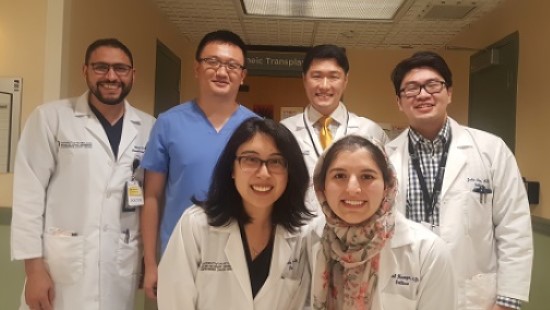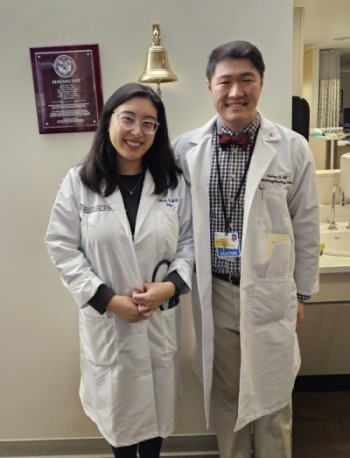Rotations - Hematology/Medical Oncology Fellowship

Below is information regarding our fellowship rotations. Here's what a typical fellow's schedule looks like.
Hematology Inpatient Consults: Provides fellows with training in the workup and management of a wide variety of hematologic conditions including: management of sickle cell disease, evaluation of thrombotic microangiopathies such as TTP/HUS, diagnosis of new hematologic malignancies, management of bleeding diathesis, and evaluation of cytopenias in the critically ill patient. The consult team is composed of a hematology attending, a first year fellow, and internal medicine residents and/or medical students on elective.
Medical Oncology Inpatient Consults: Provides fellows with training in the inpatient work-up of patients with known or suspected solid tumor malignancies. Fellows will also see malignancy related complications of established cancer center patients. The consult team is composed of a first year fellow and internal medicine residents and/or medical students on elective.
Blood and Marrow Transplant Inpatient Service: The BMT unit is a 14-bed unit dedicated to patients undergoing cellular therapeutics utilizing either CAR-T, autologous stem cell transplant, or allogeneic stem cell transplant." Remove the sentence re patient composition. Next sentence "The inpatient team is composed of a transplant attending, first year fellow, nurse practitioner, and transplant pharmacist. In addition to daily rounds, the BMT fellow meets weekly with BMT faculty to review current admitted patients.
Leukemia Inpatient Service: Patient composition include individuals with newly diagnosed or relapsed/refractory acute leukemia, aggressive lymphoma, myelodysplastic syndrome, and chronic leukemia requiring inpatient treatment. Other admissions to the service include individuals admitted with complications of their chemotherapy including febrile neutropenia. Many of these patients are enrolled on a clinical research protocol, which provides the fellow with early exposure to clinical trials. The service is composed of a malignant hematology attending, first year fellow, internal medicine residents, medical students, and an oncology pharmacist. Fellows learn and perform bone marrow biopsies, intrathecal, and intra-ommaya chemotherapy. Fellows rotating on this rotation take a lead role in presenting patients at our weekly leukemia conference in which hematopathology reviews bone marrow biopsies and patient management is discussed.
VA: Infusion/Research: During this rotation, fellows will learn the acute management of various outpatient oncologic complications including chemotherapy infusion reactions, management of chemotherapy side effects, and assessment of a patient for therapy continuation. Fellows will also use this time to perform research in conjunction with faculty members. 
Research/Elective: Dedicated time to meet with faculty and initiate a scholarly project. In addition, fellows can use this time to take various electives based on the fellow's specific interest. Electives include, but are not limited to, hematopathology, transfusion medicine, radiation oncology, gynecologic oncology, palliative care, and external opportunities at the FDA.
Hematology Outpatient: The fellow will rotate through faculty clinics in malignant hematology, lymphoma, multiple myeloma, and benign hematology. The fellow will further their knowledge regarding evidence based management of hematologic conditions as well as learning how to assess a patient for a potential clinical trial. The assigned fellow will participate in both our weekly lymphoma as well as our weekly leukemia case conference.
Thoracic Oncology Outpatient: The fellow will rotate through faculty clinics in head and neck and lung cancer. They will learn the work up and evidence based management of early stage, locally advanced, and metastatic thoracic malignancies. In addition, the assigned fellow will participate in multi-disciplinary tumor boards for thoracic oncology.
Gastrointestinal Oncology Outpatient: The fellow will rotate through faculty based gastrointestinal oncology clinics. They will take part in multi-disciplinary tumor boards for GI malignancies.
Genitourinary Oncology Outpatient: The fellow will rotate through faculty based clinics in genitourinary malignancies as well as sarcoma. The fellow will take part in multidisciplinary tumor boards for genitourinary malignancies.
Breast Oncology Outpatient: The fellow will participate in multidisciplinary breast oncology clinics through which they will learn optimal work up and management of breast cancers. They will participate in the breast oncology tumor board and rotate with both radiation and surgical oncology while on this rotation.
Palliative Care: This is a 2 week rotation for the first year fellow designed to introduce them to the principles of palliative care and symptom management. Fellows will rotate with the palliative care team.
University Continuity Clinic: Depending upon the fellow's primary interest in either hematology or oncology, each fellow will be paired with a faculty member and rotate through their continuity clinic for 18 months. This is one of two weekly continuity clinics for the fellow and allows for early exposure to a University based outpatient oncology setting.
VA Continuity Clinics: Fellows are the primary longitudinal oncologic provider for our VA population and see patients in once or twice weekly continuity clinics. First year fellows see both benign and malignant hematology patients in their continuity clinic. Second year clinic focuses on malignant hematology, prostate, breast, and lung cancer patients and third year fellows have twice a week continuity clinic in which they see patients with both genitourinary and gastrointestinal malignancies. All clinics are staffed by two disease specific faculty members. Patients receiving active treatment by a fellow at the end of the academic year can transition to the fellow's new clinic to maximize provider continuity.
